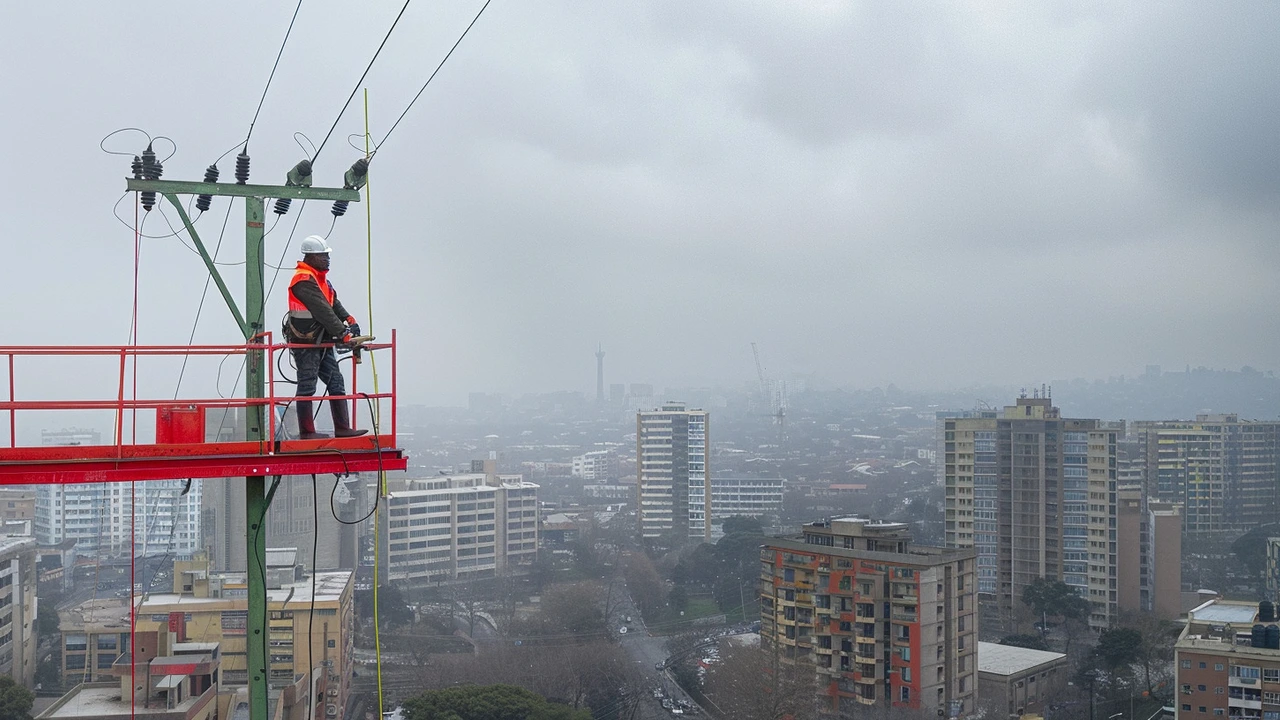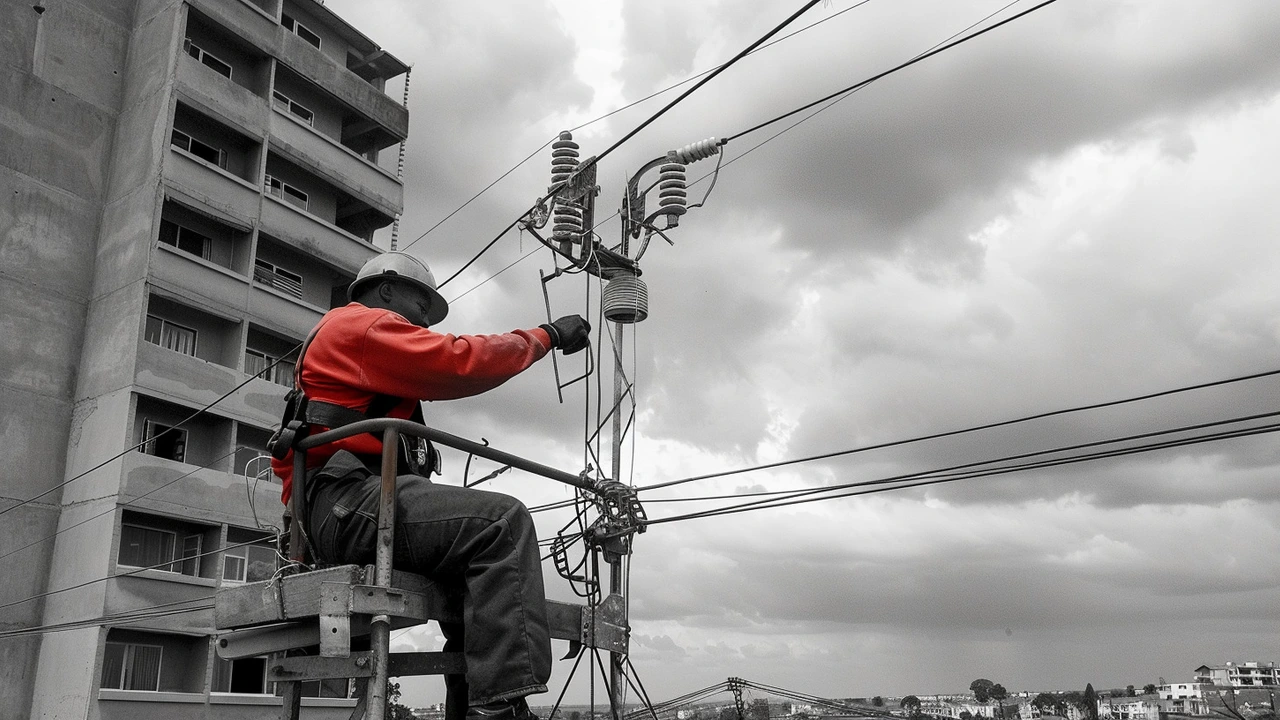
Introduction
The contrast between celebrating milestones and addressing persistent challenges is stark in South Africa's energy landscape. On one hand, Eskom, the embattled state-owned power utility, has marked two months without any nationwide load shedding. This period of stability stands out as an optimistic highlight in what has otherwise been a turbulent journey for South Africa's electricity provider. However, this sense of progress is not universally felt, particularly among residents in Gauteng's key urban centers – Johannesburg and Tshwane – who are grappling with a new wave of power cuts.
Load Reduction Measures in Johannesburg
As part of the strategy to manage the unprecedented surge in energy demand, the City of Johannesburg has embarked on a series of aggressive load reduction measures. These measures, designed to mitigate the immense pressure on the city's electricity network, specifically target high-density areas and suburbs where energy consumption has reached alarming levels. The primary approach involves using sophisticated smart meters and ripple relay systems aimed at cutting the electricity supply to high-energy-consuming appliances such as geysers during peak usage times.
These initiatives are strategically implemented during the most critical hours – from 6 am to 10 am in the mornings, and 4 pm to 10 pm in the evenings. This tactical reduction is not limited to peak hours alone; the effort to mitigate pressure extends into off-peak periods, pointing to the severity of the energy demand issue. According to City Power, the city's electricity distributor, there has been a staggering 65% increase in the evening peak load, coupled with a significant 50% rise in off-peak consumption between April and May 2024.
Combating Illegal Connections
Another layer to Johannesburg's multifaceted approach to managing its electricity woes is the intensification of operations aimed at cutting off illegal connections. These unauthorized hookups to the power grid are a major contributor to the strain on the city's resources, leading to frequent overloads and outages. By aggressively targeting these illegal connections, the City of Johannesburg aims to reduce the burden on its substations and maintain a more stable supply of electricity to legitimate users. This initiative is critical, considering the damage illegal connections can inflict on the infrastructure, potentially leading to prolonged outages and expensive repairs.

Tshwane's Load Reduction Efforts
The city of Tshwane, as another major urban hub within Gauteng, faces similar challenges. In response, Tshwane has also implemented load reduction measures to manage its stressed electricity supply. Specifically, areas serviced by the Soshanguve 132/11kV substation are subject to power reductions from 6 pm to 10 pm, aligning closely with Johannesburg's timing strategy. The operational dynamics in Tshwane involve a dedicated team of technicians who are constantly monitoring grid performance. Their role is crucial in assessing and adjusting the affected areas to ensure that the load reduction measures are both effective and minimally disruptive.
Eskom's Optimistic Outlook
Despite these regional challenges, Eskom's overall message remains optimistic. The utility has consistently emphasized its improved generation performance, which has exceeded the winter forecast. Eskom reports that unplanned outages have averaged around 11,300MW – a notable 3,000MW less than what had been anticipated. This statistical improvement is a significant milestone for Eskom, reflecting efforts to enhance maintenance routines, bolster operational efficiency, and stabilize the broader grid.
Balancing Stability and Immediate Challenges
The juxtaposition of Eskom's stable power generation and the ongoing local challenges highlights the complexity of managing electricity supply in a sprawling urban context. While the utility's national metrics show marked improvement, the immediate realities for residents in Johannesburg and Tshwane paint a more complicated picture. It is evident that localized strategies, such as the load reduction measures and tackling illegal connections, are essential components of the broader effort to ensure a reliable and consistent electricity supply.

Impact on Residents
For the residents of Gauteng, these power cuts have tangible impacts on everyday life. The implications of reduced electricity availability during peak times are multifaceted. On a practical level, there are disruptions to daily routines, affecting everything from cooking and heating water to having a reliable power source for home-based work and education. Moreover, the economic impact of these power cuts cannot be underestimated. Small businesses in high-density areas, in particular, face significant operational challenges, as they are often the hardest hit by power fluctuations. This can lead to a ripple effect, where decreased business productivity and increased operational costs translate to broader economic strain on the affected communities.
Future Outlook
Looking ahead, the ongoing dialogue between local authorities and Eskom will be crucial in navigating these challenges. Both immediate and long-term solutions will need to be developed to address the root causes of the strain on the electricity network. This could involve infrastructural upgrades, public education campaigns on energy conservation, and continued efforts to crack down on illegal connections. For Eskom, maintaining its current trajectory of reduced unplanned outages is vital. However, the utility will also need to collaborate closely with municipal entities to ensure that the improved generation capacity translates effectively to stable local supply
Conclusion
As Gauteng residents contend with the current wave of power cuts, the contrast between Eskom's national stability narrative and the local challenges faced by Johannesburg and Tshwane serves as a reminder of the complexities involved in managing a vast and intricate power grid. The path to a consistent and reliable electricity supply will require ongoing efforts from all stakeholders, with a focus on both immediate tactical measures and long-term strategic planning. The coming months will be critical in determining how effectively these approaches can be balanced to achieve a stable and resilient energy future for Gauteng and beyond.
This is such a nuanced situation 😔 I live in the US and we take power for granted, but seeing how cities are managing demand with smart meters and ripple relays? Genius. Hope they keep the human impact in mind though - no one should have to choose between heating water and feeding their kids.
so eskom says no load shedding but then city power just cuts your geyser at 7am? lmao. sounds like a glitch in the matrix. why not fix the grid instead of playing whackamole with appliances??
The 65% spike in evening peak load is statistically significant, but it's not surprising given the urbanization trend in Gauteng. The infrastructure was designed for a population half this size. The real issue isn't Eskom's generation - it's the distribution bottleneck. You can't fix a 1970s grid with 2024 demand without massive capital investment. And no, smart meters won't solve that.
They're lying. All of it. Load shedding is still happening - they just call it 'targeted reduction' now. This is how they gaslight the public. And those 'illegal connections'? That's what happens when you starve people of power for a decade. You think they're stealing? No. They're surviving. And now they're being criminalized for it.
Power cuts feel like silence in a crowded room. Everyone's waiting for something to change, but no one's sure what to say. Maybe the real problem isn't the grid - it's that we stopped believing it could work. We just learned to live with the quiet.
Eskom's 'stability' is a PR stunt. Load reduction? That's not stability. That's rationing. And calling it 'tactical' makes it sound like a military operation. It's not. It's failure dressed in a suit.
i just read this and felt so bad for people in johannesburg. my cousin lives there and said her kid had to do homework by phone light last week. that’s not okay.
Let’s not romanticize the struggle. This isn’t just about power - it’s about dignity. When your water heater is turned off because the city can’t handle demand, you’re not just inconvenienced. You’re being told your comfort doesn’t matter. That’s a moral failure, not a technical one. We need to demand better - not just from Eskom, but from every leader who looks away.
I know it feels overwhelming, but small wins matter. Every illegal connection cut, every smart meter installed - it’s building a foundation. Keep pushing for transparency. Keep sharing stories. Change doesn’t happen overnight, but it *does* happen when people don’t look away.
Oh, so now we’re supposed to applaud them for *not* doing load shedding? That’s like patting a thief for not stealing your TV this week. The bar is set so low now, even incompetence feels like progress. Sad.
You think this is about electricity? Nah. This is about control. The smart meters? They’re tracking usage patterns. The ripple relays? They’re remotely disabling appliances. What’s next - a power credit score? They’re turning the grid into a surveillance tool under the guise of conservation. This is the thin end of the wedge. Mark my words.
Westerners always come here with their 'oh how sad' faces. You think your grid is perfect? You have 200 million people living in slums in India and still we power 1.4 billion. You don't know what real struggle is. We manage. We adapt. You think we need your pity? We need your respect.
I am absolutely appalled by the systemic negligence. This is not merely an infrastructure failure - it is a moral catastrophe. The City of Johannesburg, under the auspices of municipal governance, has abdicated its fiduciary duty to its citizens. The use of 'load reduction' as a euphemism for energy deprivation is not only Orwellian - it is criminal. We must demand accountability. Now.
I get why people are angry, but I also wonder: what are we doing individually? Are we conserving? Are we reporting illegal connections? Are we supporting local energy co-ops? The system is broken, but we’re not powerless. Small actions add up.
They’re not fixing anything. They’re just moving the pain around. Cut the geyser? Fine. But then why are the rich neighborhoods still getting full power? This isn’t about fairness. It’s about who they think deserves to suffer.
guy at my work said his fridge keeps resetting. he’s just keeping food cold with ice now. no one talks about that part.
why are we even surprised? this is what happens when you let a corrupt state run everything. they don't care if you're cold. they care if their bonuses are paid.